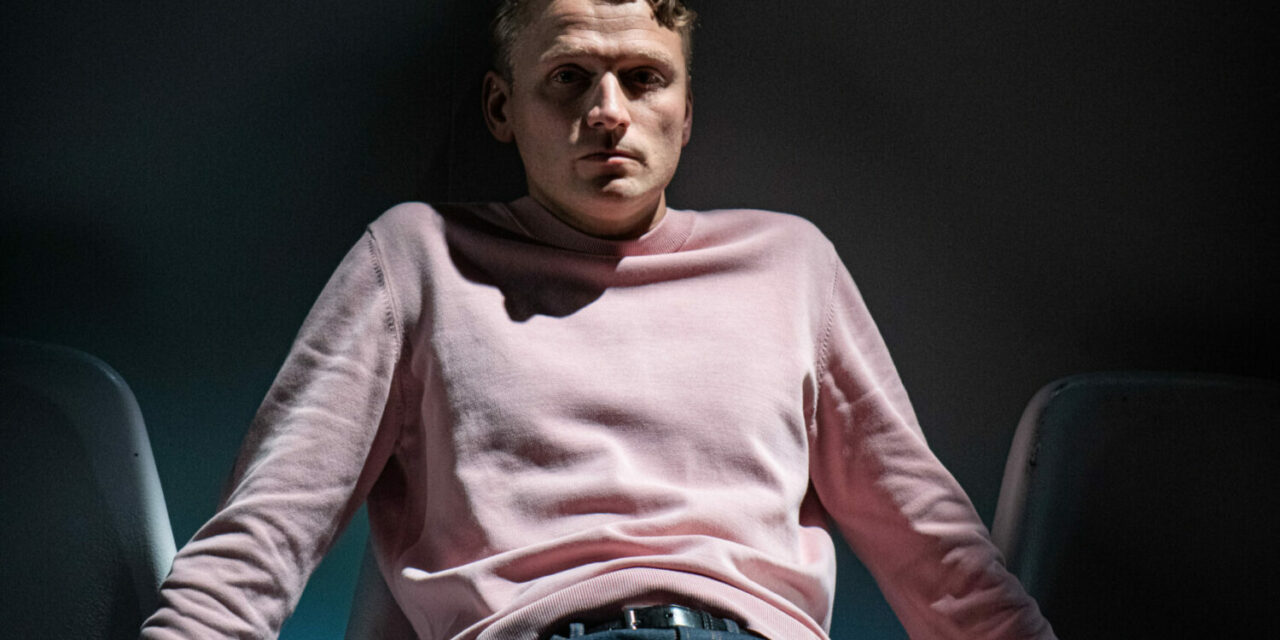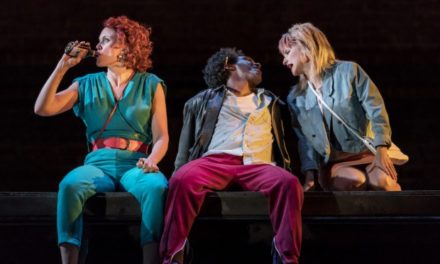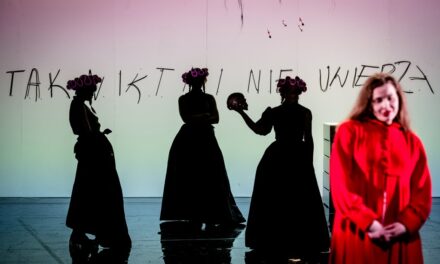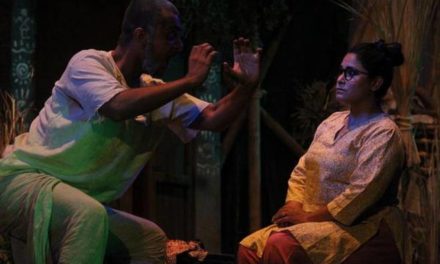It opens with a manic attempt to clean. The sheets, the floors, the smell of the air, everything must be scrubbed clean. Endless loads of laundry. Saline. Bleach. Days, months, years later Édouard is still cleaning but it’s no longer his apartment that needs the attention. As he puts it, it’s as if “between the flesh and the epidermis” the smell of the man that raped and then robbed him continues to permeate in his body. In Schaubuhne Berlin’s The History of Violence, French writer Édouard Louis’ examines and processes the real-life nightmare he endured on Christmas morning 2012. Directed by Schaubühne’s Thomas Ostermeier, The History of Violence makes its American premiere at St. Ann’s Wearhouse in Brooklyn, performed in German with English supertitles.
Born Eddy Bellegueule in the blue-collar, northern French town of Hallencourt, the now 27-year-old Édouard Louis grew up gay in a poor and often dysfunctional family. Considered one of Europe’s brightest, if not almost prodigious, new writers, Louis found instant success with his first novel En Finir Avec Eddy Bellegueule, or The End of Eddy, in 2014. Also, a play, The End of Eddy opened this week at Brooklyn Academy of Music in coordination with St. Ann’s Warehouse as a joint celebration of Louis’ work.
The details aren’t easy to hear: around four in the morning, a tired Édouard Louis walks the cold streets of Paris returning home from a Christmas party. A confrontational yet charming stranger, Reda, approaches Louis and woos his way back to Louis’ place. They have sex, they fall asleep. In the morning as Louis showers, Reda pockets Louis’ iPad and phone and attempts to leave. When confronted, Reda attempts to strangle Louis, eventually pulling out a gun and accusing him of racistly stereotyping him as a criminal because of his Algerian decent. He then rapes Louis at gunpoint before breaking down into tears and leaving. Shocked and bleeding, Louis suddenly finds himself alone yet alive, having been certain of death only a few moments prior.
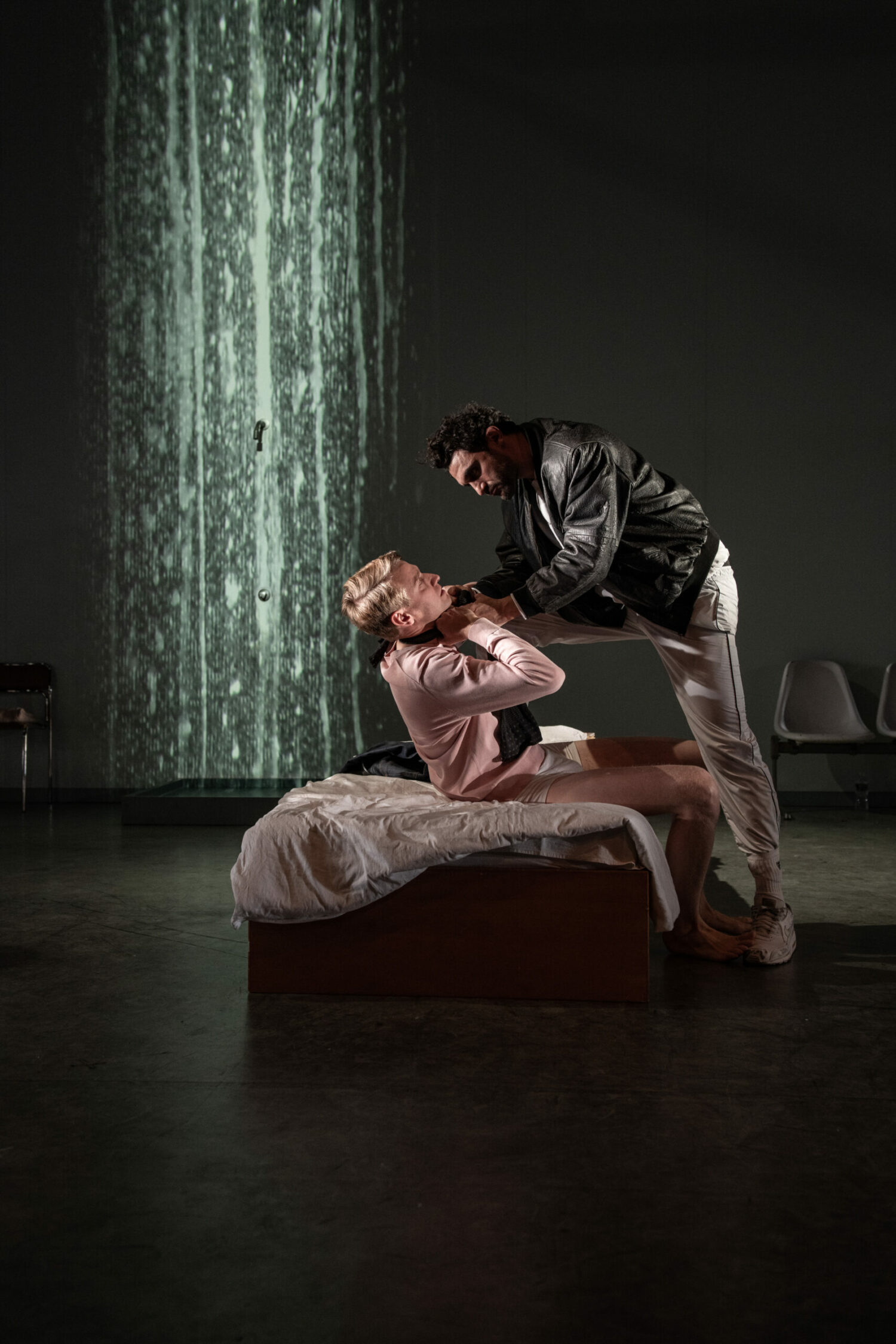
Laurenz Laufenberg (Édouard) and Renato Schuch (Reda) in The History of Violence by Édouard Louis at St. Ann’s Warehouse, 2019. Photo Credit: Teddy Wolff.
Louis doesn’t just recant these events but rather relives them. It’s a look into a post-traumatic mind, forced to process each horrific moment, again and again. Through all of this, no one hugs him, no one holds him. The hospital and police station are cold and routine. Louis’ family victim blames, criticizing Louis’ trusting and diplomatic nature. Furthermore, they’ve still yet to fully accept or understand his sexuality. Playwright Louis’ complex and intricate writing weaves together a fractured timeline to create a powerful and commanding two hours of theatre.
In a compassionate and nuanced portrayal by actor Laurenz Laufenberg, the character of Eduard Louis acts as both narrator and protagonist throughout a play that seamlessly jumps through time. He’s our charismatic yet vulnerable guide through past, present, and future. Choreographed dance breaks are occasionally thrown in, one of the few elements of the production that does not seem to fit. Reda, played with terrifying nuance by Renato Schuch, often haunts Louis, lurking onstage despite Louis’ attempts to clear him from his thoughts. The doctors, police, and his own family watch on, performed by Christoph Gawenda and Alina Stiegler. Additionally, musician Thomas Witte scores the performance live on-stage with a drum set and a small keyboard.
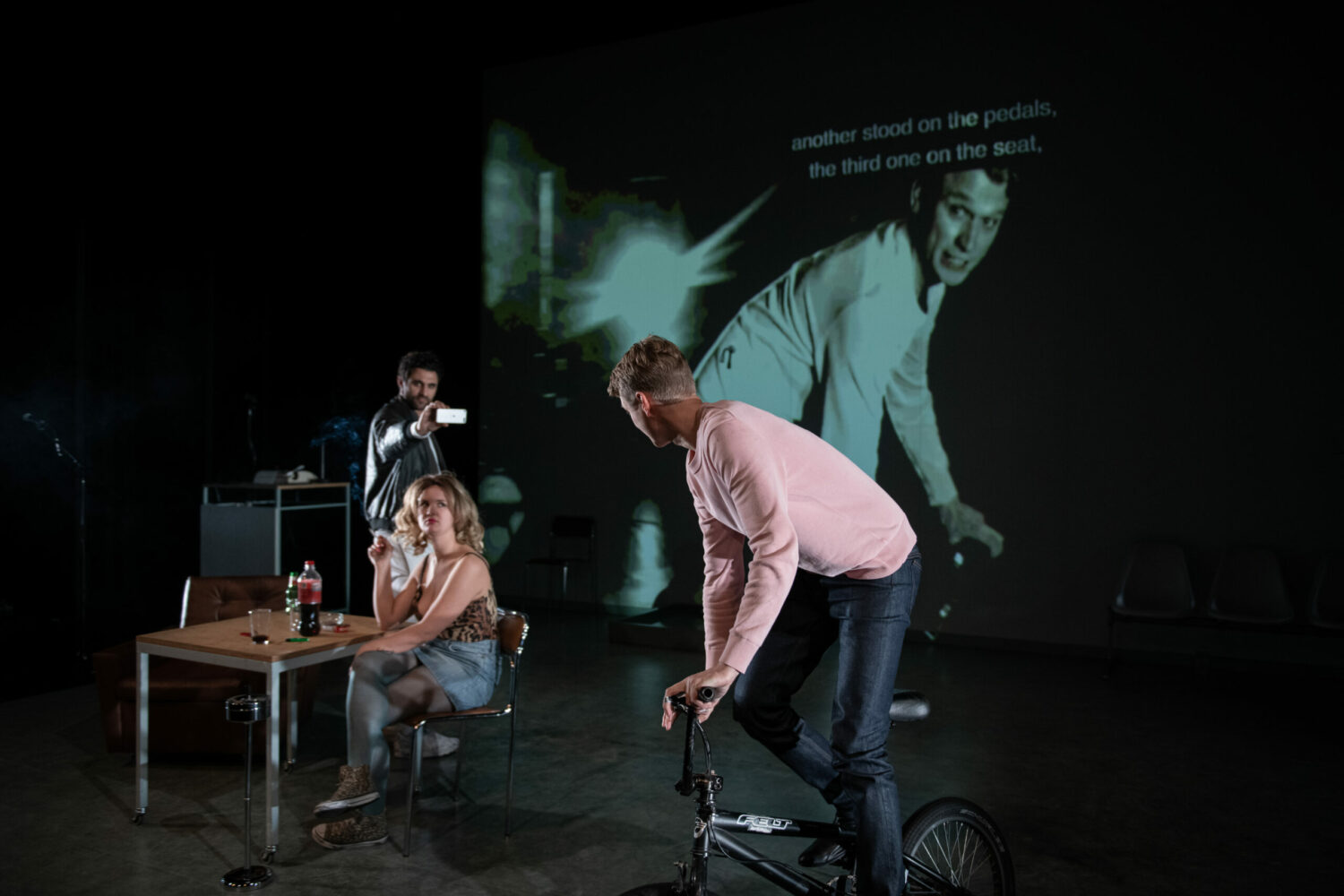
Laurenz Laufenberg (Édouard), Renato Schuch (Reda), and Alina Stiegler (Multiple Roles) in The History of Violence by Édouard Louis at St. Ann’s Warehouse, 2019. Photo Credit: Teddy Wolff.
Nina Wetzel’s simple and almost clinical set consists of a large white wall upstage. It’s used as a projection surface for live footage shot on-stage by the actors themselves. A major part of the production’s design, it’s impressively well-done. In one notable shot, a simple piece of cardboard held partially over Laufenberg’s face turns into a door behind which he is eavesdropping on his family as they, downstage, question the details of his assault. Later, Reda’s face looms over Louis who fights to escape the persistent fear of his attacker, his eyes both handsome and sinister. Overall, this modern design isn’t surprising for Schaubühne Berlin but it is effective.
The writing, along with Ostermeier’s staging, is simply beautiful. Édouard Louis shares a story of personal tragedy while also exposing France’s complicated relationships with immigrants and the LGBTQ community. The History of Violence is autobiographical but also subtly political. Louis has held back no detail and yet criticizes no one, not even Reda. He admits his healing came through lying to himself, denying parts of the harsh reality he found himself in. He also makes clear this isn’t the healthiest way of coping with trauma but, for him, it worked. Ultimately, Louis lets every character’s imperfect humanity be on display, including his own. Édouard Louis demonstrates honesty and rawness the theatre could always use more of- and the theatre could also certainly use more of Louis.
This post was written by the author in their personal capacity.The opinions expressed in this article are the author’s own and do not reflect the view of The Theatre Times, their staff or collaborators.
This post was written by John Brunner.
The views expressed here belong to the author and do not necessarily reflect our views and opinions.

